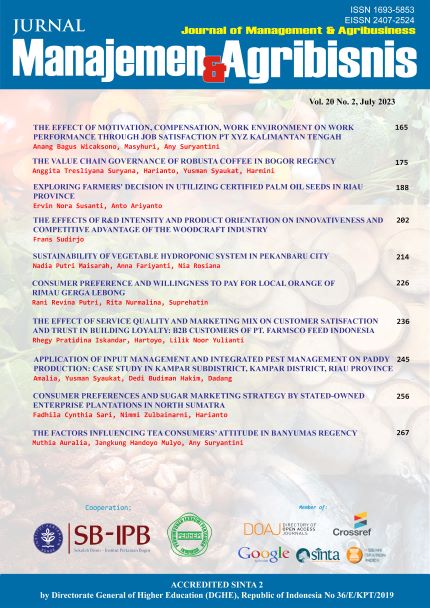The Supply Chain Analysis of FS Jasmine Rice By PT Food Station Tjipinang Jaya Using Food Supply Chain Network (FSCN) Approach
Abstract
Supply chain of FS Jasmine rice products from PT Food Station Tjipinang Jaya still facing some problems as low stock availibility, low rice quality, and high expenses but there was an increase in demand of FS Jasmine rice in 2021. Thus, the purpose of this study was to analyze the supply chain of FS Jasmine rice by using the Food Supply Chain Network (FSCN) approach comprehensively. The process of preparing Food Supply Chain Networks (FSCN) consists of supply chain structures, business processes, resources, and supply chain management. The sample in the study was 69 farmers, using the purposive sampling method by selecting farmers with the criteria of being members of the Malai Padi farmer group, CV Sandy Jaya and Tani Mulus who are partners of PT FSTJ. This research showed that the condition of the supply chain for FS Jasmine Rice in Indramayu Regency is already in good condition for each member of the supply chain because the supply chain already has clear goals, and market targets, namely domestic market and export plans, moreover development targets, namely increasing quality, product continuity, expanding market, moreover innovation and use of technology. However, optimizations are needed to strengthen the functions of farmer groups such as cultivation patterns to increase the quality, productivity per hectare, and quantity produced to meet the demand.
Keywords: farmers group, food supply chain networks, product continuity, rice, supply chain
Authors
Authors who publish with this journal agree to the following terms:
- Authors retain copyright and grant the journal right of first publication with the work simultaneously licensed under a Creative Commons Attribution License that allows others to share the work with an acknowledgement of the work's authorship and initial publication in this journal.
- Authors are able to enter into separate, additional contractual arrangements for the non-exclusive distribution of the journal's published version of the work (e.g., post it to an institutional repository or publish it in a book), with an acknowledgement of its initial publication in this journal.
- Authors are permitted and encouraged to post their work online (e.g., in institutional repositories or on their website) prior to and during the submission process, as it can lead to productive exchanges, as well as earlier and greater citation of published work (See The Effect of Open Access).

